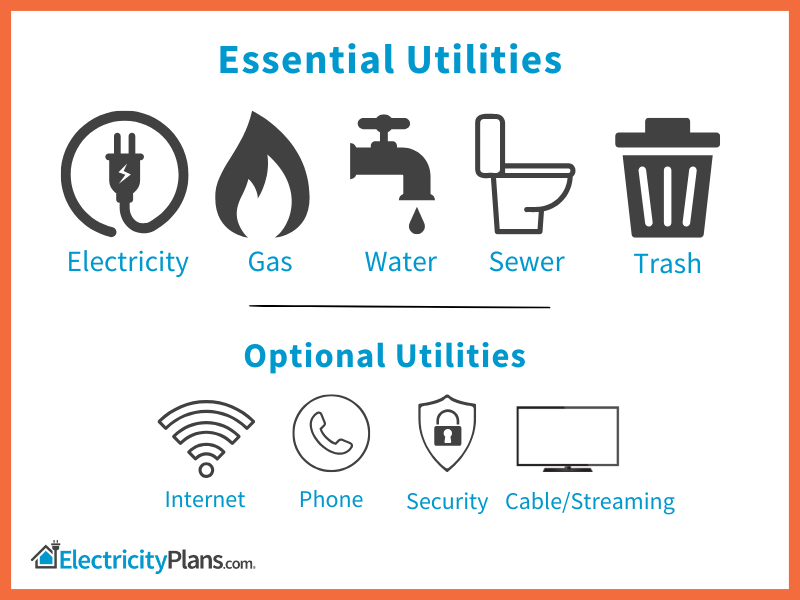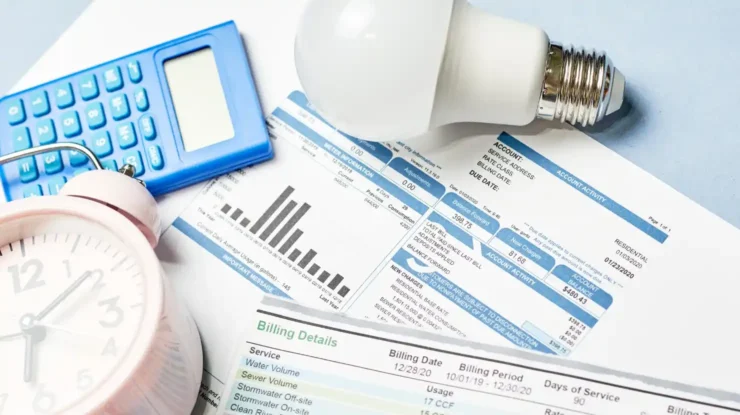Utilities are defined as the essential or optional services you need in your house, apartment, or business to keep it comfortable and functioning properly. In this article we review the 5 essential utilities plus the optional utilities that give us modern conveniences.
Key Takeaways
- The essential utilities for a house, apartment or business are: electricity, water, sewer, trash/recycling and, if applicable, natural gas.
- Optional utilities for a house, apartment or business are: internet, cable/satellite, phone and security.
Five Essential Utilities for a Home or Business
The 5 essential utilities for your home or business are:
- Electricity – Electricity is at the core of modern living, and a necessity to run our homes and businesses. Everything from entertainment, lights and heating/cooling depends on this utility. You’ll set this up with a local electric company or, in deregulated states, through a supplier.
- Natural Gas – Many homes and businesses use natural gas for heating and cooking, or for manufacturing processes. Your local utility provider or a deregulated gas supplier provides natural gas.
- Water – Your local municipality typically provides water service, with billing based on consumption.
- Sewer – Sewer services handle wastewater from sinks, toilets and showers. This it typically a municipal service, similar to water, and may even be part of your water bill.
- Trash/Recycling – Garbage and recycling services may be provided by your local municipality, or by a private company that you contract with.
Optional Utilities for Home or Business
Beyond the essentials, these optional utilities offer entertainment, connectivity, communications and security. And let’s just be real; most of these are considered essential as well!
- Internet – Internet and wi-fi services are essential for daily activities like browsing, work-from-home and entertainment. There are multiple options and costs depending on the internet speed you select.
- Cable/Satellite/Streaming – There are multiple options for TV watching including cable, satellite and streaming, each of which have different costs and benefits.
- Security – Home security options include monitored security systems or DIY security connected to the internet for remote monitoring.
- Phone – Nearly 80% of households in the US rely on wireless phones and don’t have a landline. But phones, whether VOIP or traditional landlines, are still a part of business utility expenses.

What are Utilities for a House?
Utilities in your home include electricity, natural gas, water/sewer, trash/recycling, and internet/cable, plus the optional utilities like internet and security.
As a single-family home owner, you’re 100% responsible for utility costs. If you live in a duplex or condominium complex, some of these costs, such as cable or water, may be shared.
But across all housing types, your biggest home utility expense is your electricity bill.
The average electricity bill in the US is $136 per month. Your electricity bill will vary based on the age of your house, number of occupants, climate and usage habits. You can find the average electricity bill by state in our resource guide to benchmark what you will be paying.
If you live in a deregulated electricity market like Texas, Pennsylvania or Ohio, you can shop for an alternative supplier for electricity. These suppliers, licensed by the state’s public utility commission, can help you save on your electricity bill with lower rates.
Estimated Cost of Utilities for a Home
For budgeting, here are the average utility bills per month for a typical home in the U.S. These average utility bill costs are compiled from sources across the internet, including the Energy Information Administration, Angi, Thumbtack, Redfin and Rent.
| Utility Type | Average Monthly Cost | Savings Options |
|---|---|---|
| Electricity | $100-$200 ($136 national average) | Energy efficiency measures; shop for electricity in deregulated states |
| Natural Gas | $30-$50 | Energy efficiency measures |
| Water & Sewer | $40-$70 | Monitor usage and check for leaks |
| Trash & Recycling | $20-$40 | Reduce single-use packaging |
| Internet | $50-$100 | Promotional offers; speed options |
| Cable or Streaming | $20-$150 | Promotional offers; reduced channels; streaming |
| Security Services | $20-$100+ | Monitored vs. unmonitored; self-manage alerts vs. services |
Check out our guide to save on utility and household bills for tips on how to cut utility bills!
What are the Utilities in an Apartment?
Apartment living has some big advantages when it comes to utilities.
- Trash/recycling is typically covered by your apartment complex.
- Water/sewer may be metered separately for each apartment, or you may pay a pro-rated amount of the complex’ water and sewer bill based on square footage and number of occupants.
- Electricity usage is lower than in single family homes, due to smaller square footage. New construction apartment buildings are also highly energy efficient. And there are special offers for apartment renter electricity.
- Basic cable may be included in your rent.
- Public areas in the apartment complex may have wi-fi that you can use for free.
When shopping for an apartment, ask which utility services are included in your rent. Then make sure the details of any included utilities are in your lease!
Wondering where to start to set up utilities? Your landlord or apartment manager can give you a list of options for each of your utilities.
However, if you are in a deregulated electricity market, we recommend that you comparison shop online rather than signing up with the apartment complex’ recommendation. Many times, apartment managers receive a payment for their referrals, and they are not recommending the cheapest price!
Your landlord or apartment manager may require proof of utilities set up in your name before you move in. Keep an electronic copy of all your enrollment confirmations so you can provide this proof.
What are Common Utilities for a Business?
Utilities for a business will depend on two things: (1) the type of business you run and (2) whether you own or lease your location.
The type of business will dictate the utilities that are most important to you. For example, in an office, you’ll focus on electricity for lights and climate control, plus internet and phones. In a machine shop you’ll focus on electricity to power manufacturing processes.
Your location also has a big impact on your business utilities. If you own your own commercial real estate location, you’re responsible for 100% of the upkeep and utilities. If leasing, the type of commercial lease will determine what utilities you are responsible for.
For example, with a full service or gross lease, you’ll pay rent and utilities and the landlord pays all operating expenses. Under a net lease, you’ll pay rent, your utilities and a portion of the utilities for common areas.
Utilities for a business include:
- Electricity. You’ll work with the local utility company to start electricity service, which may require an occupancy permit. In some deregulated states, you can also pick an electricity provider to supply your electricity. If leasing, check to see if you have your own meter (in which case, you’ll need your own electricity account) or if you’re paying a pro-rate based on your square footage.
- Natural Gas. You may also have natural gas in your location, which is used in many industrial and commercial processes, and for cooking in restaurants.
- Water/Sewer. Water and sewer are typically provided by the local municipality for a monthly fee based on volume.
- Trash/Recycling. This may be a municipal service in your area, or you may need to contract with a local company. If you have industrial waste from your business you’ll also need to factor that in. For example, you’ll need a disposal plan for metal or wood waste from manufacturing or cooking grease from a restaurant.
- Internet. You’ll need internet access to maintain your communications with the outside world.
- Phone. You’ll need phone service, likely with multiple phone lines.
How do You Set up Utilities for Your Home?
The question of utilities typically comes up when you are moving to a new location or at the end of a service contract.
Most utilities run a credit check prior to establishing a new account. If you don’t meet minimum credit thresholds, you’ll need to pay a deposit equal to one or two month’s estimated service.
Consumers in Texas have options for prepaid electricity with no credit check. And in many states, you can provide a copy of good payment history from your prior utility and have a deposit waived.
Setting up utilities is part of our modern life. Hopefully this article ensures that you know all the types of utilities you’ll need.
FAQs About Utility Bills
You can get emergency help for utility bills by calling 211. This will connect you with utility bill help near you. Other places to help pay utility bills include houses of worship and local non-profits. Reach out to each utility provider to see if they can help. You may qualify for a deferred payment plan or other assistance.
In general, you can discard utility bills after one year, which allows you to track any discrepancies and changes in your spend. If you have a home office and deduct part of your utility bills on your taxes, you should keep these records for three years in case of an audit. For easier record keeping, download an electronic copy of your bills rather than keeping paper copies.
There are two ways to lower your utility bills: use less or shop for a lower rate. You can use less through conservation. For example, use a low flow showerhead to conserve water, or set your thermostat 4 degrees higher than normal in the summer. You can shop for a lower rate on your electricity and natural gas in deregulated markets. And you can shop for the best deal on internet, streaming and cellular phone service. This guide to lowering utility bills has additional tips.
